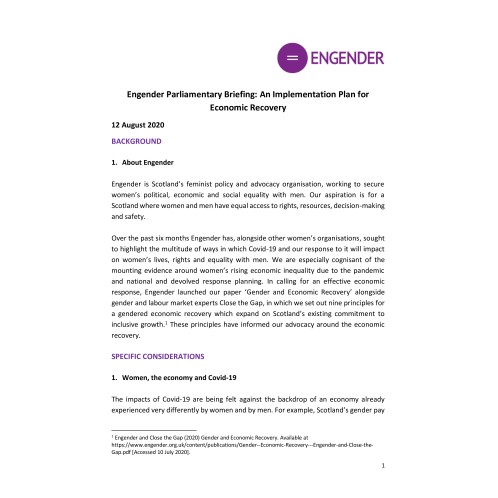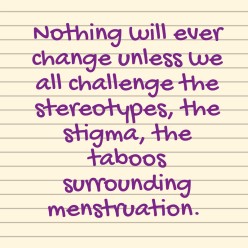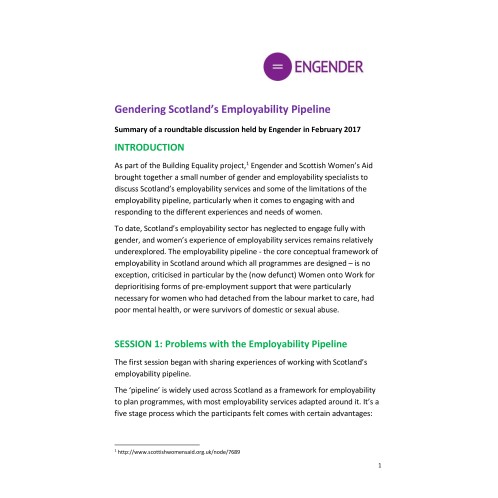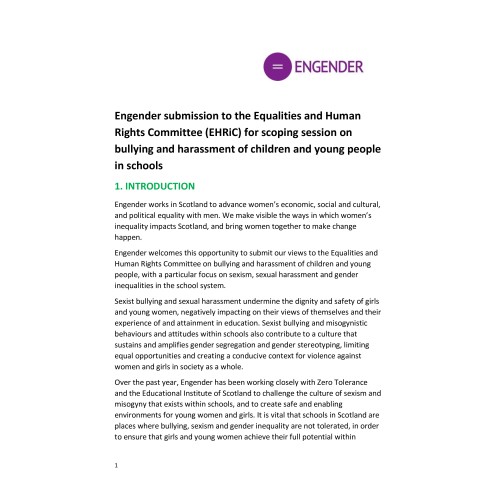Education and training
Gender stereotyping from a very early age has an impact on the decisions that girls and boys make about subject and career choice, ultimately leading girls towards lower paid and undervalued work.
Sexist and sexual harassment is also endemic in schools and colleges. Ofsted found that, across the UK, 9 out of 10 girls had experienced sexist name calling and 92% of girls had been sent unsolicited explicit pictures or videos.
Education about women and girls’ equality remains voluntary, and is often dependent on individual members of staff to promote.
Lifelong learning initiatives, employability programmes and modern apprenticeships routinely ignore the needs of women, particularly migrant and refugee women who may not have English as a first language, disabled women, and unpaid carers.

Engender Parliamentary Briefing: An Implementation Plan for Economic Recovery
Aug 12, 2020: This is an Engender briefing for MSPs ahead of the Scottish Government debate on an Implementation Plan for Economic Recovery on 11th Agust 2020. Over the past six months Engender has sought to highlight the multitude of ways in which Covid-19 and our response to it will impact on women’s lives, rights and equality with men. We are especially cognisant of the mounting evidence around women’s rising economic inequality due to the pandemic and national and devolved response planning.
This parliamentary briefing calls on Scottish Government to go further to ensure that economic recovery also closes the gap between women and men. We urge Scottish Government to scale up its ambition and the necessary action to deliver a meaningful economic (and social) recovery for women that not only responds to the threat of deeper inequality as a result of Covid-19 but actively realises women’s economic rights and revalues women’s work.
Date of publication: August 2020.
genderpaygap covid19 faireconomy care education employment
GUEST POST: Notes from the classroom - Prevention work in the Highlands
Blog – Feb 12, 2019
education guestblog vaw
Guest post: Period shaming is a serious problem
Blog – Dec 15, 2017
education guestblog health periodpoverty
Gender equality and the Sustainable Development Goals
Blog – Dec 14, 2017
education health international politics socialsecurity
Summary of 'Gendering Scotland’s Employability Pipeline' Roundtable
Aug 24, 2017: As part of the Building Equality project, Engender and Scottish Women’s Aid brought together a small number of gender and employability specialists to discuss Scotland’s employability services and some of the limitations of the employability pipeline, particularly when it comes to engaging with and responding to the different experiences and needs of women.
Date of publication: August 2017.
employment education gendermattersroadmap
Summary of 'Gender Matters in Education' Roundtable
Feb 24, 2017: As part of developing our Gender Matters Roadmap, in December 2016 Engender held a roundtable to discuss gendered education strategies for Scotland. The roundtable brought together a small group of expert participants and practitioners to think creatively about some of the gender equality challenges in the Scottish school system, and to collaboratively develop specific policy measures.
Key themes that emerged from the discussion included:
• Addressing a pervasive culture of misogyny and harassment in schools and countering gender stereotyping
• Addressing gender equality and violence against women and girls in teacher training
• The need to look at school strategy, leadership, aims and management through a gendered lens and the importance of taking a ‘whole school’ approach
• The need for better data gathering on incidents of sexism and misogyny in schools, and better reporting frameworks on progressing gender equality
Date of publication: February 2017.
education gendermattersroadmap
Engender Submission to the Scottish Parliament Equalities and Human Rights Committee on Bullying and Harassment of Young People
Feb 15, 2017: Engender welcomes this opportunity to submit our views to the Equalities and Human Rights Committee on bullying and harassment of children and young people, with a particular focus on sexism, sexual harassment and gender inequalities in the school system.
Sexist bullying and sexual harassment undermine the dignity and safety of girls and young women, negatively impacting on their views of themselves and their experience of and attainment in education. Sexist bullying and misogynistic behaviours and attitudes within schools also contribute to a culture that sustains and amplifies gender segregation and gender stereotyping, limiting equal opportunities and creating a conducive context for violence against women and girls in society as a whole.
Date of publication: October 2016.
education vawg
Guest Post: Pioneering Women’s Education in Scotland
Blog – Sep 22, 2016
education guestblog international
Gender Audit Series: Education & Training
Mar 5, 2014: A summary and discussion of the implications of data from the Gender Audit of Statistics [Breitenbach,E. and Wasoff, F. Scottish Executive Social Research 2007] relating to care and caring prepared by S. Macpherson, Engender Associate and E. Thomson.
education training socialcareIn this section
- Latest publications
- Equal Media & Culture Centre
- Care
- Education and training
- The labour market
- Health
- Abortion and reproductive healthcare
- Women's representation
- Public space
- Social Security
- Violence against women
- -- Primary Prevention
- Women's rights
- Our economy

Newsletter
Sign up to receive our newsletter here:
Sign up to our mailing list
Receive key feminist updates direct to your inbox:
